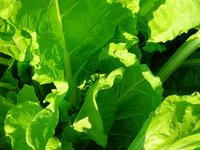Côtes de b(l)ettes

As far as Elizabeth David was concerned, blette was edible only if cooked by a master's hand and swimming in a rich cream sause (An Omelette and a Glass of Wine, 1984).
Blette? As in 'overripe and rotten'? No wonder it wasn't one of her favourite dishes. But this vegetable becomes tastier if we get rid of the l: bette, French for beta vulgaris, chard or Swiss chard in (American) English, silver beet in down-under-English, Mangold in German and snijbiet in Dutch. Nomenclature and food, it's no easy thing. Witness for example The Old Foodie, a marvellous weblog on historic food topics, who discusses the multilingual ethymology of Scarcity Root, another name for the very same vegetable.
So, let's pick a name: chard. It is an easy crop, as every gardener can tell you. The leaves can be treated as spinach, though I wouldn't eat them uncooked, the stems as celery or asparagus. I prefer the lucullus variety (Lucullus, an 'able soldier' and Epicurean who 'after unpleasant experiences in Caesar's consulate retired to live in refined luxury and lapsed into insanity', The Oxford Classical Dictionary) or the multicoloured rainbow chard to the more common dark green cicla.
In The Netherlands you need a kitchen-garden(er) if ever you want to eat chard, as it is nowadays a 'forgotten vegetable', a crop that is no longer commercially grown. Spouse confessed she has had to eat hotchpotch with chard in her youth, which her mother must have gotten from the greengrocer's (but then, she is three years my senior). A Dutch food encyclopaedia from the fifties (Culinaire encyclopedie, Elsevier 1957) still gives a number of recipes, all traditional French style: Côtes de bettes à la béchamel, à la mornay, au jus. We usually eat chard, stems and leaves, Italian style: sautéed in olive oil with plenty of garlic and the optional anchovy.
Now where does the l in blette come from? It's not a typo, as Elizabeth David is not the only one to use this word. So does Stehpanie Alexander in The Cook's Companion (Lantern 2004). I'll give you my theory, for want of a better one. In Alexander's book I came across yet another name for chard: leaf beet. Now the German word for leaf is Blatt, pl. Blätter. No need for much Chinese whispering to get to blette, is there? Si non e vero, e ben trovato.


0 Comments:
Post a Comment
<< Home